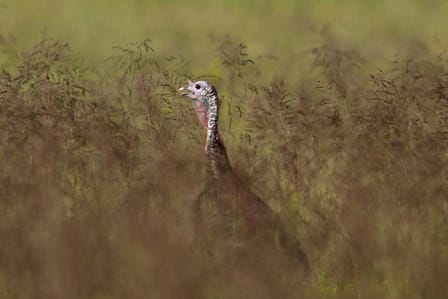

PRATT, Kan. -(Ammoland.com)- The Kansas Wildlife, Parks and Tourism (KDWPT) Commission conducted a public hearing in Liberal on Oct. 20, 2016. The seven-member nonpartisan commission approved several regulations brought before them by KDWPT staff.
All public hearing items were discussed and workshopped at previous public commission meetings.
Regulations governing the fall turkey hunting season were first on the agenda and were most controversial. KDWPT staff recommended authorizing fall turkey permits in only two of the six Turkey Management Units.
Current regulations allow over-the-counter fall turkey permits, one per hunter, in five of the six units, and hunters can purchase three additional turkey game tags valid in Unit 2 (northcentral region).
Staff, following an adaptive turkey management model, recommended authorizing fall turkey permits, one per hunter, only in Units 1 and 2.
The decision was based on a downward trend in resident hunter success rates during the spring season and several years of below-average turkey production.
During discussion, several commissioners expressed concern over losing the fall turkey hunting tradition if permits weren’t authorized for a number of seasons. Commissioners ended up approving an amended regulation that allows an unlimited number of hunters to purchase one over-the-counter either-sex turkey permit valid in Turkey Management Units 1, 2, 3, 4, 5, and 6. (Fall hunting is not authorized in Unit 4 (southwest region). The fall turkey season is Oct. 1-Nov. 28, 2017 and Dec. 11, 2017-Jan. 31, 2018.
Commissioners also approved a minor correction to a management unit boundary description in the spring turkey regulation.
Kansas state park goers will have the option of purchasing an “Unconventional Motor Vehicle Permit” next year. The $50 annual permit will allow park users with valid driver’s licenses to drive golf carts or work-site utility vehicles on park roads from sunrise to sunset.
Currently, only vehicles legal for street driving are allowed. This permit would not cover or allow ATVs.
In other park regulations, the Commission approved recommended fee increases for park permits. During the prime season (April 1-Sept. 30), Annual Camping Permits will increase from $200 to $250, Overnight Camping Permits from $7 to $9, and 14-night Camping permits from $99 to $110.
During the off-season (Oct. 1-March 31), Annual Camping Permits will increase from $150 to $200, Overnight Camping Permits from $6 to $9, and 14-night Camping Permits from $85 to $110.
Fisheries staff presented a variety of regulations to the commission, and all were approved. Floatline fishing is no longer restricted to daylight hours and the season was amended to be year-round (current regulations allow setlines from sunup to sunset and only during the July 15-Sept. 15 season).
Floatline fishing is still allowed only on designated waters. The baitfish regulation, which required bait dealers to issue a sales receipt and anglers to possess the receipt while fishing with live bait, was removed. And Hillsdale Reservoir was added to the Aquatic Nuisance Species list after zebra mussels were confirmed last summer.
Commissioners also approved a variety of recommended changes to the reference document, which lists creel and length limits by species for each body of water.
Creel and length limit changes include a two-fish per day creel and 21-inch minimum length limit for walleye at Milford Reservoir, a 15- to 21-inch slot-length limit for largemouth bass at Big Hill Reservoir, increasing the daily creel for striped bass at Wilson Reservoir to five, and an 18-inch minimum length limit on walleye and saugeye at Kanopolis Reservoir.
The Commission will meet next on Jan. 5, 2017 at the Flint Hills Technical College in Emporia.
About the Kansas Department of Wildlife, Parks and Tourism:
As a public steward of the Kansas natural resources, the mission of the Department of Wildlife, Parks and Tourism is to: Conserve and enhance Kansas natural heritage, its wildlife and its habitats–to assure future generations the benefits of the state’s diverse, living resources; Provide the public with opportunities for the use and appreciation of the natural resources of Kansas, consistent with the conservation of those resources; Inform the public of the status of the natural resources of Kansas to promote understanding and gain assistance in achieving this mission.
For more information on KDWPT, please visit www.kdwpt.state.ks.us.
